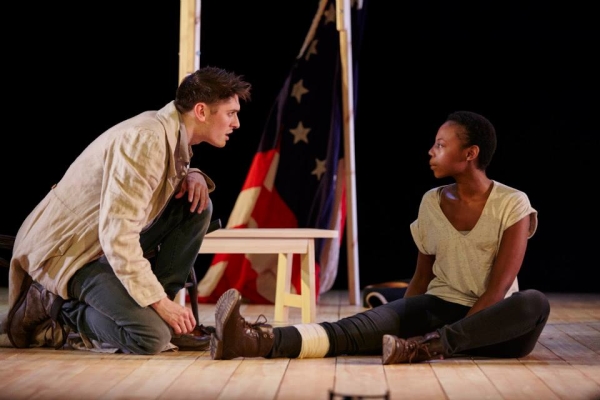Jefferson's Garden (Watford Palace) – Wertenbaker explores America's roots
‘Wertenbaker is particularly good on the forces of history; the way complex events become black-and-white and ambiguous ideas ossify’

© Richard Lakos
Wertenbaker plunges us into the American Civil War, following a young Quaker, Christian (David Burnett), as he defies his family's pacifism to fight for freedom from British rule. On the other side, a black slave girl, Susannah (Mimi Ndiweni), is fighting with the British on the promise of her own personal freedom.
Afterwards, Thomas Jefferson, played by William Hope as a man of conscience and consequence, must reconcile those two freedoms, turning the idea of a nation founded on liberty into a reality. It's a task he'll both accomplish and fail: to establish a functioning democracy he has to compromise his egalitarianism and permit slavery. Freedom, he say, can't be "an experiment that didn't work."
This is just the basis of a vast historical sprawler that roams from Virginia to revolutionary France, stuffed with ideas and analogies. It's a pretty gruelling watch nonetheless. Brigid Lamour's Brechtian staging has a Quakerish simplicity: bare wooden stage, grayscale costumes, a soundtrack of silence. The result is as dry as a mouthful of Quaker Oats.
More's the pity, because Wertenbaker's onto something vital: the task of starting a society from scratch, merging utopian ideals with utilitarian practicalities. She shows the courage it takes to challenge a status quo, as sons and daughters, slaves and nations stand up to their fathers, masters and rulers. Yet, just as we've seen successful revolutions collapse in on themselves in recent years, something similar happens here: Jefferson's ideals give way to something simplified and corrupted. Some end up more equal – and more free – than others.
'Oh, for a trace of humour, some joy in the playing'
Wertenbaker is particularly good on the forces of history; the way complex events become black-and-white and ambiguous ideas ossify. If history is written by the victors, Jefferson's Garden hones in on the writing process: how language defines the world we live in. One man's revolutionary is another man's insurgent. Slogans shapeshift too – 'Liberté égalité, justice' for example – and, as they do, so does the cause. It's self-aware too: the chorus frequently flag up Wertenbaker's own amalgamations and simplifications, though that playfulness fades as the play trundles on.
As it does, it has plenty to say on the subject of freedom and, in particular, whether it's an ideal worth chasing. Are we free to forget ourselves, as Christian does in renouncing his Quakerism? Are we free to forget others? To forget history? Start a new nation from scratch without heeding history and you're likely to repeat its mistakes.
Big ideas, for sure, but, oh, for a trace of humour, some joy in the playing. Instead, Larmour's cast mostly plant their feet, clutch their lapels and act with their chins: historical acting at its coarsest. Mind you, Wertenbaker's speechifying dialogue demands it and only Ndiweni emerges really well: a hearty presence as Susannah.
Jefferson's Garden runs at Watford Palace until 21 February












